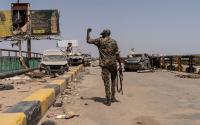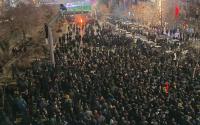By MICHAEL R. GORDON
WASHINGTON, Jan. 8 — Senior American officials said today that they were increasingly concerned that they were running out of time to persuade Turkey to permit the deployment of American ground troops in case of a war with Iraq.
"From the military planning standpoint, we have just about reached the critical mass point for a yes or no from Turkey," said a senior United States official who is familiar with American preparations.
While the main ground attack in a war with Iraq would be mounted from Kuwait, the Pentagon would also like to use Turkey to open a northern front by using it as a staging area for a land offensive, the officials said in recent interviews.
Yet more than a month after Deputy Defense Secretary Paul D. Wolfowitz visited Turkey seeking approval to deploy the American forces, public opinion in Turkey remains overwhelmingly against the war, and Turkey's new government has repeatedly taken the position that it would be politically difficult to accommodate a major deployment of American ground troops.
Compounding the problem, some Turkish officials are insisting that the government cannot make a decision without a second United Nations resolution approving military action.
Senior administration officials confirmed tonight a report in The Washington Post that the United States was sharing significant intelligence data with United Nations weapons inspectors in recent days. Though the administration is not turning over all of its sensitive intelligence, officials say that what has been provided has enabled the inspectors to go into a number of specific facilities and seal them off before Iraqi officials could spirit away evidence that they possessed or were developing chemical, biological or nuclear weapons.
Turkey's Parliament, which by law has to approve the stationing of foreign troops, is not expected to take up the issue until Hans Blix, a chief United Nations weapons inspector, delivers his report on Jan. 27 outlining what has been found in the inspections.
One immediate issue concerns American plans to upgrade Turkish ports and airfields to accommodate American troops. During his visit to Turkey, Mr. Wolfowitz indicated that the Pentagon was prepared to spend several hundred million dollars to upgrade the bases and ports.
A Pentagon plan called for sending a survey team to inspect the bases and ports in December so that work could begin on the bases by mid-January. But the survey team has not yet been sent.
Turkey's strategic importance to any assault on Iraq has long been clear. By invading Iraq from the north as well as the south, the United States and its allies hope to strike at President Saddam Hussein's overstretched forces from different directions and quickly overwhelm them. Washington also wants to stabilize the Kurdish areas in northern Iraq to preclude any confrontation between the Turkish military and Kurdish forces.
"We're quite comfortable with what we can do from the south," Mr. Wolfowitz said during his visit to Turkey last month. "Obviously if we are going to have significant ground forces in the north, this is the country they have to come through."
American officials said today that they can conduct a successful attack to oust Mr. Hussein without access to land bases in Turkey. But they acknowledge that such an attack would be, as one ranking official put it, "harder and uglier."
The United States has close relations with Turkey, a NATO ally, and the Bush administration has mounted a major effort to secure Turkey's assent to its deployment plans.
President Bush has played host to Recep Tayyip Erdogan, the leader of Turkey's governing party, and strongly supported Turkey's bid to enter the European Union.
Marc Grossman, the under secretary of state for policy, recently flew to Ankara to discuss a package of grants and loans on favorable terms that could help offset the effects of a war. Turkish officials said the financial package could be worth up to $14 billion, but American officials said it might be worth more.
Bush administration officials have also indicated they might accept a second Security Council resolution authorizing a military attack on Iraq, if they thought they could muster the necessary support. But unsure of whether the support in the Council will be there, Washington still insists that such a resolution is not a prerequisite for action.
While Turkey has indicated that it would allow the United States to use its air bases, as Washington did during the Persian Gulf war of 1991, it has continued to express major reservations about the deployment of American ground troops.
"The government has indicated its preparedness to meet American requests basically in all areas with the exception of the stationing of large number of ground forces in Turkey," a Turkish official said.
Turkish officials have said Washington is seeking to deploy as many as 80,000 armed forces members on its territory, but a senior United States official said the actual figure was substantially lower.
The Turkish government has to contend with a public that opposes an attack on its neighbor and is not favorably disposed to the United States.
According to a recent poll by the Pew Research Center, 83 percent of those surveyed did not think American forces should be permitted to use Turkish bases to attack Iraq. Only 30 percent had a favorable view of the United States, compared with 52 percent a year ago.
Some American officials say the new Turkish government has failed to prepare its public for a war.
"We are dealing with a new and inexperienced leadership that is feeling very much caught by the situation," an American official said.
The issue of upgrading the military bases has been particularly difficult. The Turkish government recently decided that the Pentagon survey team could go, but its departure has been delayed by a dispute over whether members of the team would be subject to Turkish law during their mission.
American and Turkish officials said the dispute appeared to be on the way to resolution and could be settled as soon as Thursday. Still, that is weeks behind schedule. One senior official estimated that it could take 45 days to fully prepare a ground attack from Turkey.
Some American officials hold out hope that Turkey is simply bargaining hard and will eventually go along. But even with Turkey's assent, it is possible that the Americans will not get clearance for the troops levels they are seeking, they said.
American planning for a ground attack from the south appears to be far more advanced. Gen. James L. Jones, the commandant of the Marine Corps, who will soon take up new duties as NATO's top commander, said today that the marines, who have a camp in Kuwait and are also planning to send an amphibious force to the region, anticipate that 65,000 to 75,000 marines would be deployed in a conflict with Iraq.
While the Americans and British would like the Turkish government to begin preparing its public for a possible war, Prime Minister Abduliah Gul has been emphasizing efforts to avoid a conflict.
The prime minister has visited Syria, Egypt and Jordan as part of a diplomatic tour that he says may lead to a peaceful resolution of the dispute with Iraq. He is planning a visit soon to Iran and Saudi Arabia.
American officials said the prime minister might be trying to demonstrate that his government has made every effort to find a peaceful solution before supporting an attack.






